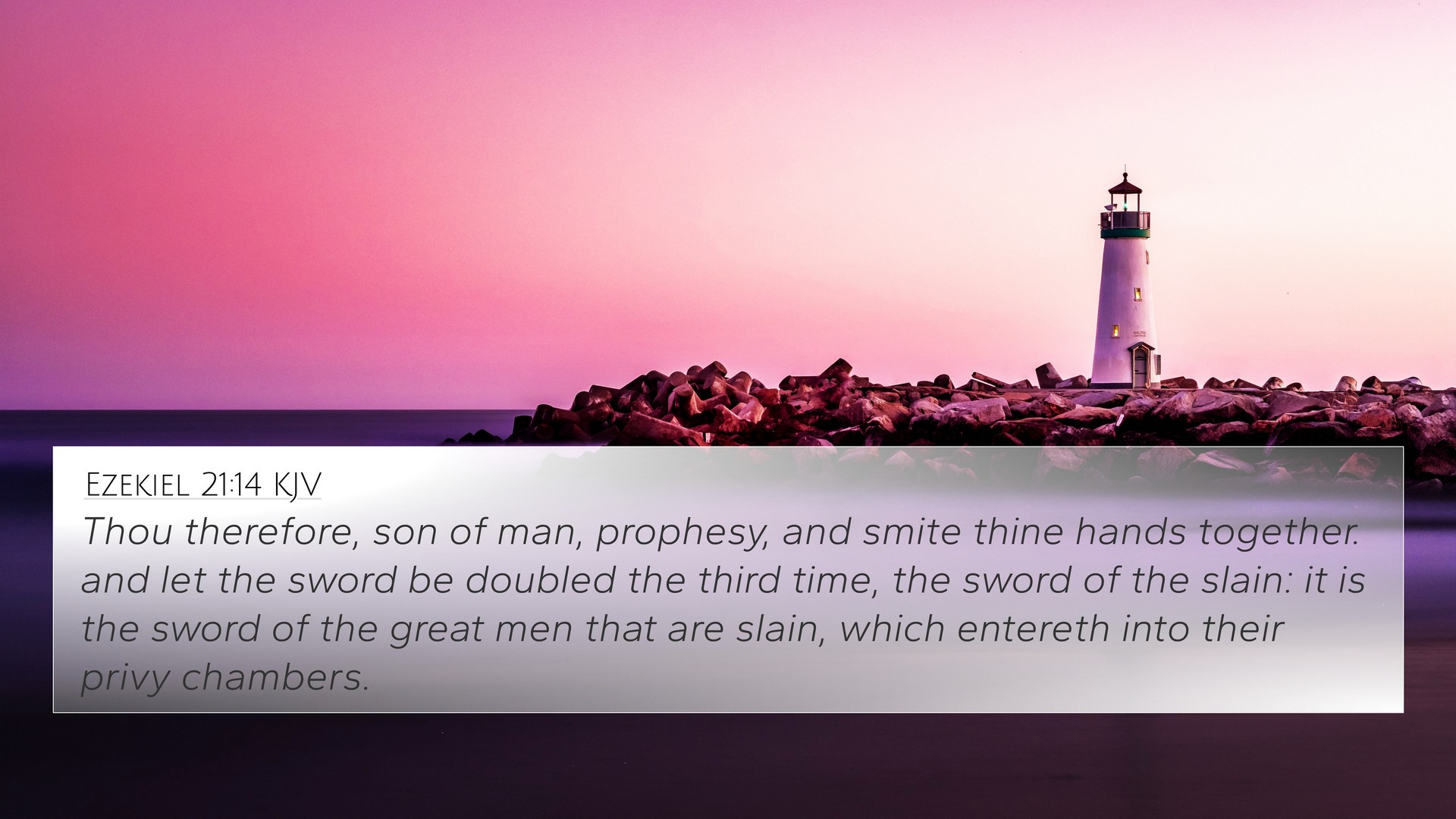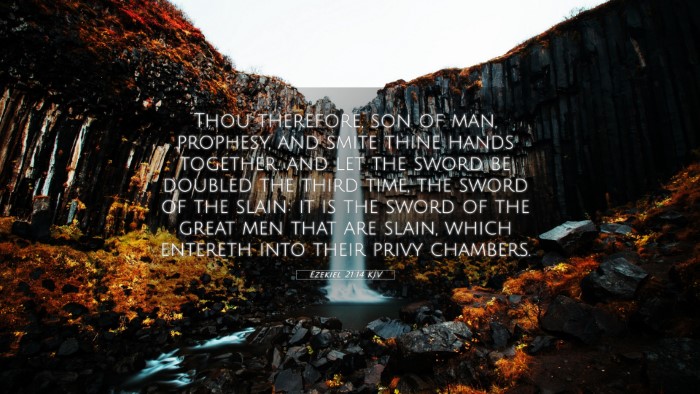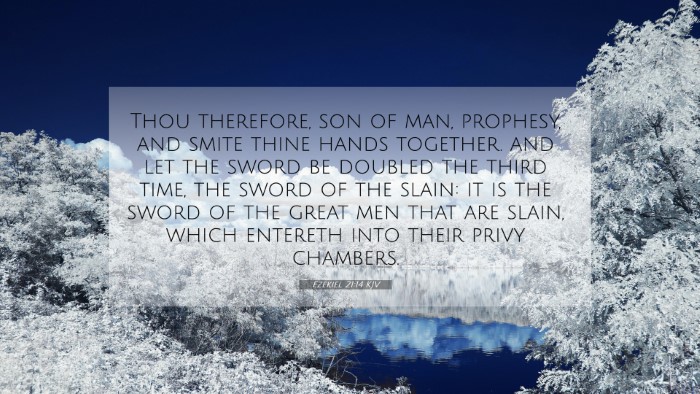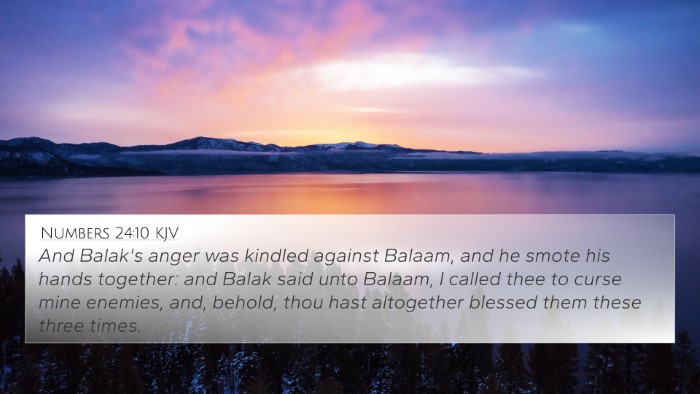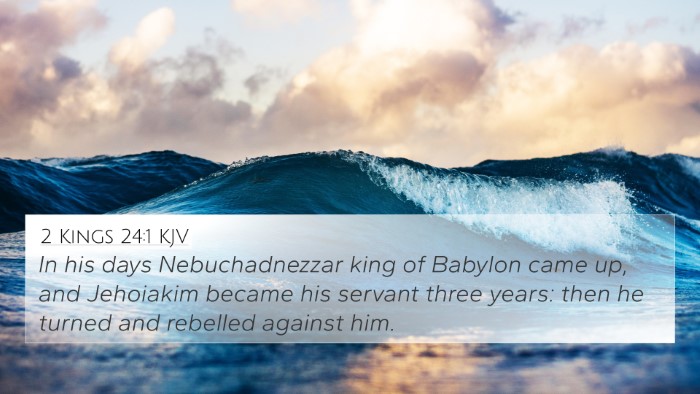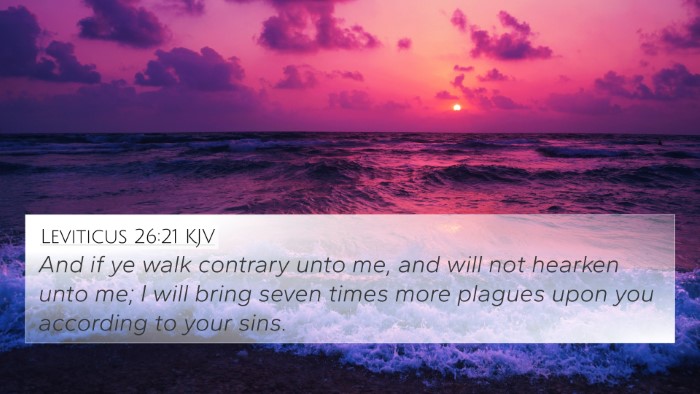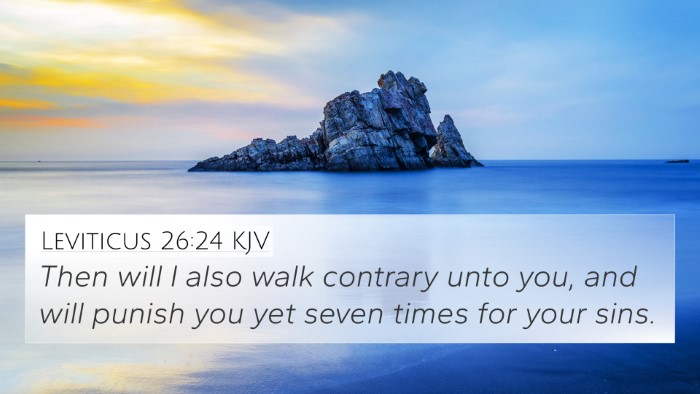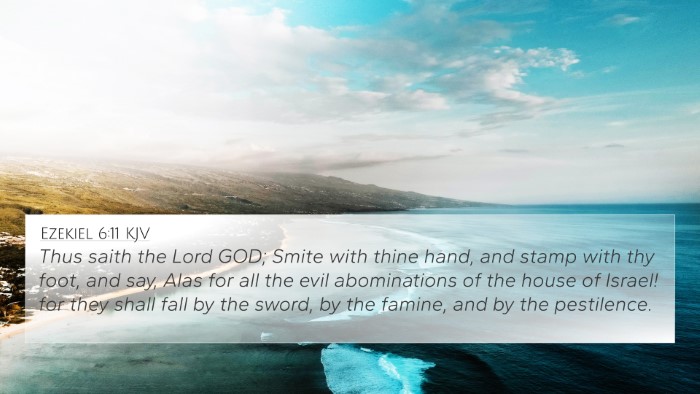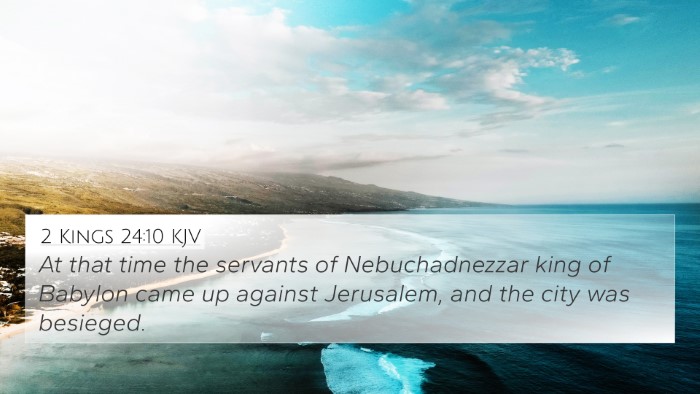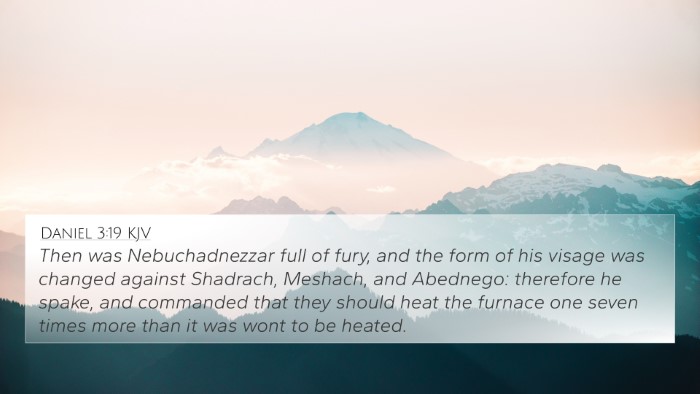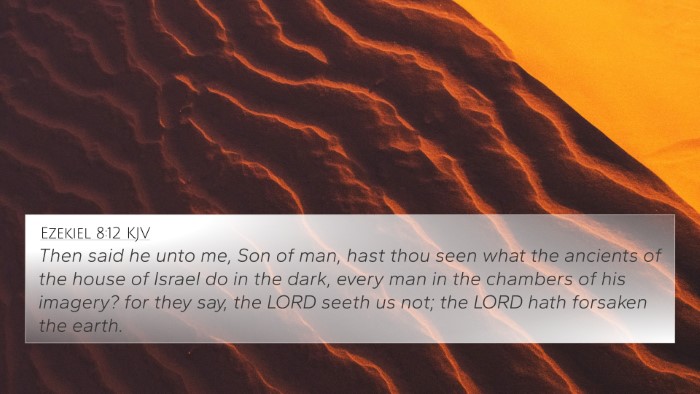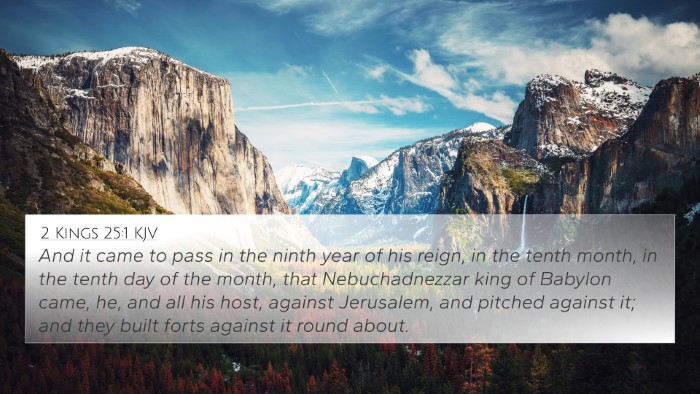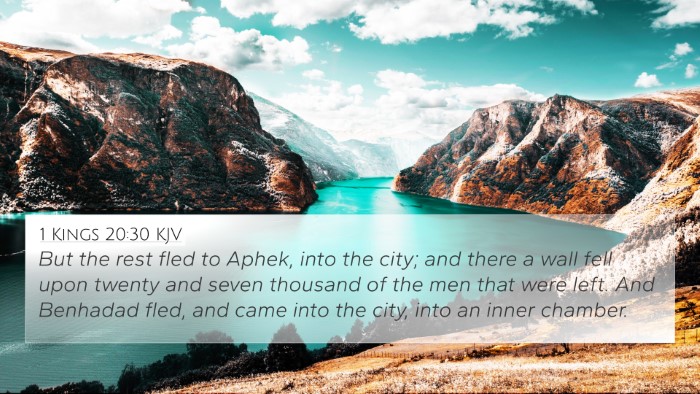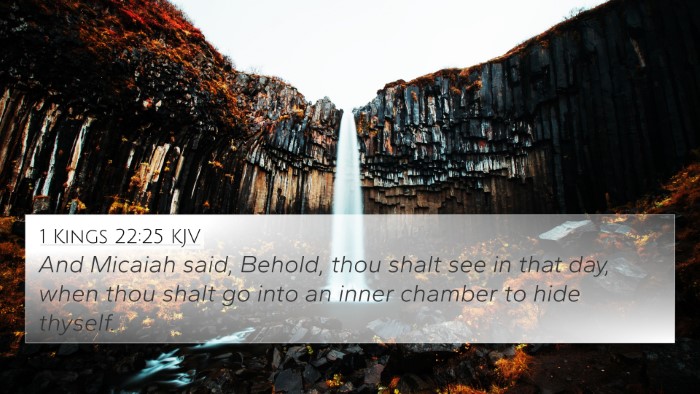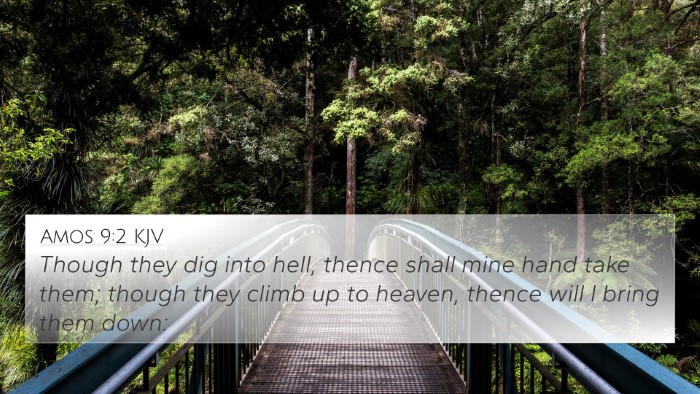Ezekiel 21:14 - Interpretation and Meaning
Verse: "Thou therefore, O son of man, prophesy and smite thy hands together: and let the sword be doubled the third time, the sword of the slain: it is the sword of the great men that are slain, which enter into their privy chambers."
Overview
The prophet Ezekiel is conveying a serious message about impending judgment and destruction. This verse signifies the necessity of judgment upon Jerusalem and is a prophetic declaration demonstrating the severity of God's wrath against the people's sins.
Commentary Insights
Combining insights from notable public domain commentaries:
- Matthew Henry: Ezekiel emphasizes God’s judgment akin to a double-edged sword, indicating that the violence and calamity to come will be drastic and severe. Henry reflects on the nature of God's wrath and His indecisiveness in delivering judgment against persistent sinfulness.
- Albert Barnes: Barnes highlights the symbolic act of striking hands as a prophetic gesture indicating the certainty of the prophetic declaration. He elucidates how this act represents the gathering of forces against Jerusalem and foretells the judgment on the leaders and mighty men of the land.
- Adam Clarke: Clarke interprets the verse as a symbolic representation of the sword of execution - it is a clear manifestation of God's judgment being brought forth through the Babylonian army. Clarke also touches upon the emotional aspect of this prophecy, urging listeners to awaken to the seriousness of their spiritual state.
Cross-References
Ezekiel 21:14 relates to several other biblical texts illustrating similar themes of judgment, prophecy, and divine retribution:
- Ezekiel 30:24: "And I will strengthen the arms of the king of Babylon, and the arms of Pharaoh shall fall down." - This highlights God's use of foreign powers to enact His judgment.
- Jeremiah 25:29: "For, lo, I begin to bring evil on the city which is called by my name." - Affirming the location of judgment as Jerusalem.
- Isaiah 34:5: "For my sword shall be bathed in heaven." - A depiction of God's judgment overtly expressed through a metaphor of a sword.
- Ezekiel 9:1-2: "He cried also in mine ears with a loud voice, saying, Cause them that have charge over the city to draw near." - Another call for judgment upon Jerusalem.
- Lamentations 3:43: "Thou hast covered with anger, and persecuted us." - Reflects the lament of the consequences faced due to sin.
- Amos 3:2: "You only have I known of all the families of the earth: therefore I will punish you for all your iniquities." - God’s particular relationship with Israel raises the stakes of accountability.
- Revelation 19:15: "And out of his mouth goeth a sharp sword, that with it he should smite the nations." - A New Testament parallel showcasing the authority and judgment of Christ.
- Luke 21:24: "And they shall fall by the edge of the sword." - Foretelling the fate of Jerusalem's people in Jesus' prophecy.
- Matthew 26:52: "For all they that take the sword shall perish with the sword." - A reiteration of the principle regarding violence and consequential outcomes.
- Isaiah 1:20: "But if ye refuse and rebel, ye shall be devoured with the sword." - Presenting a direct link to the consequences of disobedience.
Thematic Connections
The themes present in Ezekiel 21:14 resonate throughout the Bible, showing interconnectedness in God's message regarding sin, judgment, and repentance:
- Judgment: Many verses echo the theme of divine judgment, reiterating that sin leads to consequence.
- Prophetic Duty: Prophets are often called to deliver God's message to His people, as seen in both Old and New Testaments.
- Israel’s Accountability: Frequent reminders of Israel's unique covenant relationship with God and the serious nature of their obligations.
- Symbolism of the Sword: The sword symbolizes not only conflict but also divine judgment across various scriptures.
Conclusion
Ezekiel 21:14 serves as a powerful reminder of the consequences of disobedience and the seriousness of God's judgment. The inter-Biblical dialogue throughout scripture emphasizes the continuity of God's message to His people and underscores the relevance of cross-referencing biblical texts to grasp the full scope of divine communication.
Tools for Study
Utilizing bible concordance and bible cross-reference guides can enhance understanding of verses like Ezekiel 21:14:
- Identifying connections between verses allows for deeper insight.
- Comprehensive Bible cross-reference materials can facilitate rich exploration of themes.
- Engaging in cross-referencing Bible studies promotes thorough comprehension of scriptures.
Further Study Topics
Consider exploring these topics for a comprehensive understanding:
- How to find cross-references in the Bible.
- Detailed cross-reference between Gospels.
- Cross-referenced themes in the Bible.
Interpreting Biblical themes through cross-references for sermons and teachings.
